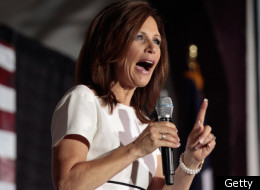 WASHINGTON -- While stumping on a platform of limited government, Republican presidential contender Rep. Michele Bachmann (R-Minn.) has focused on the growth of federal pay under the Obama administration, saying it is representative of broader government excess.
WASHINGTON -- While stumping on a platform of limited government, Republican presidential contender Rep. Michele Bachmann (R-Minn.) has focused on the growth of federal pay under the Obama administration, saying it is representative of broader government excess.But Bachmann's go-to talking point on the subject is grossly misleading and obscures her own voting record on federal pay.
While on "Fox News Sunday" this past Sunday, Bachmann said, "We had one employee at the federal Department of Transportation that made $170,000 a year at the beginning of the recession."
"We had the trillion dollar stimulus, and 18 months into the recession, we had 1,690 employees making over $170,000," she continued. "Government has really been growing at -- a lot of largesse. But people in the real world aren't. And that's what has to change. Government has no conformity at all with the real world."
While it's true that the number of Transportation workers making $170,000 or more a year increased after Obama took office, the boost, authorized under President George W. Bush, was caused by a modest pay raise for highly-trained employees, not a hiring spree associated with stimulus spending. What's more, Bachmann herself voted in 2008 for a separate bill that increased federal worker pay. Bachmann's office did not respond to a request for comment on the statistic, which she has oft-cited.
As the Washington Post reported, Bachmann's numbers come from a 2009 USA Today article, which reads, "When the recession started, the Transportation Department had only one person earning a salary of $170,000 or more. Eighteen months later, 1,690 employees had salaries above $170,000."
The 2009 economic stimulus bill isn't mentioned anywhere in the USA Today article, and for good reason: It has nothing to do with the pay raises Bachmann has been referring to of late. The boost in the employees making $170,000 came from a modest salary increase, most of which went to air traffic controllers, expert professionals responsible for the lives of thousands of airplane passengers each day.
"Because of the technical difficulty, stressful nature, and critical importance of the air traffic controller work, many of the highest paid employees at the Department of Transportation work in air traffic control," a Department of Transportation spokesperson wrote in a statement sent to The Huffington Post. "In December 2007 (the beginning date used by USA Today in compiling their 2009 report), the statutory cap on yearly salary was set at $168,000, and a number of senior air traffic control employees were at the statutory cap. For that reason, once the cap was raised by the Bush Administration in January 2008 and 2009, even modest year to year salary increases bumped a number of air traffic control employees over the arbitrarily chosen $170,000 limit used in the USA Today report."
Percentage-wise, the pay increase Bachmann keeps referring to is actually quite small, John Palguta, vice president for policy and research at the Partnership for Public Service, pointed out. And most federal employees have been working under a pay freeze for the last couple years, he added.
"What you want to do is pay a salary that is in the ballpark competitive with other major employers, if you're the government," said Palguta. "No one wants to overpay federal workers -- I certainly don't. I'm a taxpayer too, and I'm a former fed. But you don't want to underpay either, such that you're not getting people who are the best at what the job is."
Bachmann herself voted to increase federal worker pay in 2008 as part of an effort to make pay for expert scientific positions in the government competitive with the private sector -- a similar move to retain highly-skilled employees. Bachmann joined 417 other House members, including 191 other Republicans, in voting for the Senior Professional Performance Act, which was signed into law by Bush in 2008, and took effect under Obama in 2009.
Many budget experts view a general attempt to narrow the federal budget deficit by focusing on federal worker pay as impractical. Taking into account the 2.7 percent increase in total federal employee pay Obama requested for the full-year 2012 budget from 2010 levels, total federal worker pay would amount to $461.2 billion -- about 12 percent of the total federal budget request of $3.7 trillion.
In the 2008 federal budget, the last budget Bush signed, federal pay totaled $400.0 billion, compared to total government spending outlays of $3.0 trillion -- meaning that federal worker pay accounted for about 13 percent of total government spending.
Those numbers include soldiers' salaries, which Bachmann has repeatedly sought to protect -- most recently in her proposal to not raise the federal debt ceiling, but continue making payments to U.S. creditors, Social Security recipients and members of the military. Under Obama, military salaries account for 33 percent of all federal worker pay, compared to 34 percent under Bush.
Origin
Source:
No comments:
Post a Comment